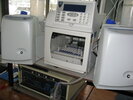Ion chromatography
Ion chromatography is a process that allows the separation of ions and polar molecules based on their charge. It can be used for almost any kind of charged molecule including large proteins, small nucleotides and amino acids. The solution to be injected is usually called a sample, and the individually separated components are called analytes. It is often used in protein purification, water analysis, and quality control.
Ion-exchange chromatography retains analyte molecules on the column based on coulombic (ionic) interactions. The stationary phase surface displays ionic functional groups (R-X) that interact with analyte ions of opposite charge. This type of chromatography is further subdivided into cation exchange chromatography and anion exchange chromatography.
At TPM we have the possibilities to measure both anions as well as cations. In our research on transport of ions trough permeable materials having possibilities to quantitatively measure the ion concentrations. By combining it with NMR it is very useful to be able to quantitatively measure the ion distribution in samples.
